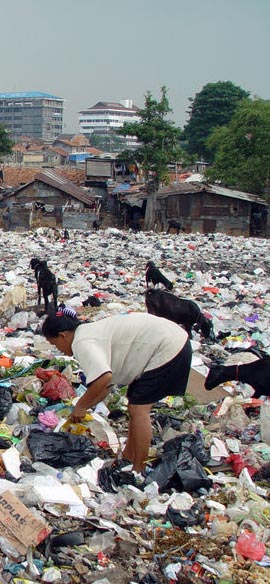Third World USA
 With the election of Barack Obama, Americans are starting to glimpse the reality of our political situation. No matter who we elect president, he or she is going to represent only one several groups — black people, white people, gay people, conservative people, liberal people. Even more, we realize that what makes each group distinct is its need for leadership that reflects its interests, and that these inherently conflict with each other.
With the election of Barack Obama, Americans are starting to glimpse the reality of our political situation. No matter who we elect president, he or she is going to represent only one several groups — black people, white people, gay people, conservative people, liberal people. Even more, we realize that what makes each group distinct is its need for leadership that reflects its interests, and that these inherently conflict with each other.
If you’ve noticed that “revolution” and “collapse” come up more frequently in conversation these days, you’re not alone. Unfortunately, most of the bloviation on this topic remains entirely unrelated to history. If you read enough about the past, you will see that patterns repeat and no age is as unique as it thinks it is. One of these repeating patterns is the gradual collapse of nation-states, and it rarely ends in the exciting fire and brimstone people expect.
Surveying the map, we can see that many places once had prosperous, organized, scientific and highly advanced civilizations. Most of these places are now part of what we used to call The Third World, and now call “developing nations,” because a sanitized euphemism always makes the unpopular, inconvenient and disturbing truths go away. When good nations go bad, they end up as burnt-out Third World ruins.
Some general traits of Third World nations:
- Kleptocratic, oligarch/warlord, junta-based government.
- Lack of public services.
- Rampant corruption.
- Population IQ in mid-90s or below.
- Anarchistic, crime-ridden streets.
- Education rare.
- A few really rich, mostly really poor.
- People live in denial.
- Punishment of taboo ideas.
A popular myth is that these nations ended up in such conditions through a single revolution or imperialist event. When we read history, however, we see a clear gradual decline from a leading nation to a corrupt one and then, everything falls apart slowly, leaving a mass of illiterate, mostly-dumb, usually ethnic hybrid people who perpetuate their own social disaster.
 Another popular myth is that third world nations lack technology. They have technology; they didn’t invent it, and they must import it, which with a kleptocracy in power and rule by oligarchs means it is unlikely to distribute far. Even more, they tend to be bad at maintaining it. We pair this myth with the “they just need education” myth to feel better about this inequality, but the fact of the matter is that third world education programs rarely succeed beyond one generation. The infrastructure and social value system that rewards education just is not there.
Another popular myth is that third world nations lack technology. They have technology; they didn’t invent it, and they must import it, which with a kleptocracy in power and rule by oligarchs means it is unlikely to distribute far. Even more, they tend to be bad at maintaining it. We pair this myth with the “they just need education” myth to feel better about this inequality, but the fact of the matter is that third world education programs rarely succeed beyond one generation. The infrastructure and social value system that rewards education just is not there.
Those of us who believe we should pay attention to science find it easy to see a cause: the population has a low IQ and as a result, can be counted on to consistently make stupid decisions, which is what empowers the oligarchs. Unruly groundlings? Start a war. Claim someone’s a witch doctor and watch the burning. Instigate pogroms whenever the people notice they’re starving. But we can’t blame the oligarchs; they are the symptom. The cause is a clueless and self-destructively disorganized population.
For example, we know that the basics of agriculture are not that complex. Most third world nations are in fertile regions with plenty of rain. Yet somehow there is rarely enough food. Between the fighting of elites and different social groups, and the disorganization of people who can imagine tomorrow “sort of” but cannot think two weeks or six months into the future, there is no way to make an infrastructure for the orderly distribution of food. So people starve, forget, and then steal when they wake up in a stupor of hunger.
In a good many of these third world nations, the elite resemble people in first world nations: educated, intelligent, and often constructive. However, they have complete disregard for the starving masses, which seems horrible until we consider that the cluelessness of those masses is what keeps them in their condition. Then it makes sense: trying to help those who cannot help themselves is a lost cause that “feels good” in a Hallmark card sense, but never succeeds. Better to spend that effort on making more elites.
To steer off those who think I’m espousing a simple equation which others have, which is “having people from third world countries (e.g. of minority races) = becoming third world,” I’m not. The slide into third world decline is multicausal and can only be called decay in the same way cancers of the body are. History suggests that great nations become neurotic and unsure of themselves, and their democracies become unwilling to face difficult long-term truths and so instead stick a band-aid on everything, and as a result infrastructure fails.
Inevitably, with such a state, the wealthy decaying civilization is going to import labor of lower general intelligence than its population. However, it will also dumb its own population down by rewarding pleasant liars over hard-eyed realists, and so will marry off its prettiest girls to ugly cynical men and will beat down any smart person who mentions an intelligent plan that conflicts with “the way we do things around here.” Dying nations are reactionary, even in their liberal movements.
We’re starting to see solid signs of the USA sliding into a state like that of Brazil, Mexico, and Argentina. In each of these nations, a relatively high-IQ European founding population has lost power, and now rules through finance, while a vast population of mixed natives, Europeans, Asians and Africans grows through constant breeding, causing a few rich to become the target of many poor. Each was once prosperous like the USA and in fact, at times more prosperous than the USA at the time.
Let’s look at the signs of the decline:
Gillies, a 27-year veteran of the FBI, called corruption in all its multiple forms, whether in law enforcement or in the judicial system, or involving tax cheats and fraudsters, “our number one criminal threat” in the United States.
He said public corruption investigations by the FBI were “huge” and had increased by more than 20 percent in the last five years, while financial scams — from securities and hedge fund frauds to Ponzi schemes — had jumped by more than 25 percent nationwide in the last year alone.
Corruption is a general term meaning that those in positions of authority are acting for personal benefit at the expense of their roles, not to fulfill their roles. This is separate from acting for personal benefit by fulfilling a role; a well-paid cop who enforces justice is usually welcome, but a cop who takes money to ignore injustice is generally seen as corrupt. Those watching the news for the past three decades will note that stories about public corruption are increasing across the nation, which is separate from the grand American tradition of having some cities (Chicago comes to mind) run by corrupt authorities.
Mexican drug cartels are helping elect and influence politicians in U.S. communities to advance their criminal activities, an expert on international gangs alleged.
Richard Valdemar, a retired California law enforcement officer, said authorities in California gathered intelligence showing that the cartels are corrupting American politicians to gain a foothold in the Southwestern United States.
Previous investigations showed that the Carrillo Fuentes, Arellano Felix and Sinaloan drug cartels targeted Southern California cities including South Gate, Hawaiian Gardens and Bell Gardens.
It’s funny how this news doesn’t get farther in the mainstream press. Perhaps it is because in a culture of corruption, the buyer doesn’t matter. What matters is the status quo willingness of politicians to be corrupt, because they face an ugly choice: gain the huge amounts of money required to join the elites, or be ground down with the rest. They are probably unaware of the damage they cause because they think the haves/have-nots gap has always been with us. It has, but in different degrees. In third world nations it’s nearly binary.
Now let’s ask the vital question — are we dumbing ourselves down? This next story comes from the UK, but similar tactics are at work in the USA:
As many as three-quarters of state schools are failing to push their brightest pupils because teachers are reluctant to promote ‘elitism’, an Ofsted study says today.
Many teachers are not convinced of the importance of providing more challenging tasks for their gifted and talented pupils.
In nearly three-quarters of 26 schools studied, pupils designated as being academically gifted or talented in sport or the arts were ‘not a priority’, Ofsted found.
Teachers feared that a focus on the brightest pupils would ‘undermine the school’s efforts to improve the attainment and progress of all other groups of pupils’.
 The smart are unpopular with clueless masses, who tend to see them as witch doctors and burn them, because smart people can see, explain and do things that are magic to those of lesser intelligence, who simultaneously don’t recognize they are of lower intelligence. What is popular must prevail over what is right, what is convenient must prevail over what is true, and so on — that’s the path to the third world.
The smart are unpopular with clueless masses, who tend to see them as witch doctors and burn them, because smart people can see, explain and do things that are magic to those of lesser intelligence, who simultaneously don’t recognize they are of lower intelligence. What is popular must prevail over what is right, what is convenient must prevail over what is true, and so on — that’s the path to the third world.
Another facet of nations heading into third world status is that they become dependent on others. Their food is mostly imported; their wars are fought by mercenaries; their cities thrive only because they are tended to be an army of domestics and manual laborers whose labor is inexpensive because they are coming from third world nations and have fewer skills and lower expectations.
It was an ecological disaster that occurred on the other side of the planet. Yet the drought that devastated the Australian wheat harvest last year had consequences that shook the world. It sent food prices soaring in every nation. Wheat prices across the globe soared by 130%, while shopping bills in Britain leapt by 15%.
A year later and the cost of food today has still to fall to previous levels. More alarmingly, scientists are warning that far worse lies ahead. A “perfect storm” of food shortages and water scarcity now threatens to unleash public unrest and conflict in the next 20 years, the government’s chief scientist, Professor John Beddington, has warned.
Since we are living through the labor of others, and with the comfort of imports, we have started to treat money as figures on a page that have no consequences except in a distant, unconsidered future. This leads to what former Republican strategist and author Kevin Phillips calls “financialization,” or a tendency to make money by the selling and trading of financial notes instead of developing products or sources of income themselves. It’s like a Ponzi scheme, except that it also has a circular component in addition to the traditional Ponzi Pyramid: we move investments back and forth in the system, generating “income” but not adding to our wealth as measured in real-world objects.
But the national debt — currently over $8 trillion — is only the tip of the iceberg. There has also been an explosion of corporate debt, state and local bonded debt, international debt through huge trade imbalances, and consumer debt (mostly in the form of credit-card balances and aggressively marketed home-mortgage packages). Taken together, this present and future debt may exceed $70 trillion.
It is most of all a product of the “financialization” of the American economy — the turn away from manufacturing and toward an economy based on moving and managing money, a trend encouraged, Phillips argues persuasively, by the preoccupation with oil and (somewhat less persuasively) with evangelical belief in the imminent rapture, which makes planning for the future unnecessary.
 This falls in parallel with an advertising culture, a consensual social reality, and political dogma — each succeeds through this circular motion. We convince others in other parts of our vast system of the value of something, and derive paper money value from it, even if no actual wealth was created. Without this solipsistic cycle, we might be dead in the water as an economy; its weakness is that we are depending on our own frenetic activity to keep the cycle going, while we erode the future by not finding better, newer or more consistent ways of making actual wealth.
This falls in parallel with an advertising culture, a consensual social reality, and political dogma — each succeeds through this circular motion. We convince others in other parts of our vast system of the value of something, and derive paper money value from it, even if no actual wealth was created. Without this solipsistic cycle, we might be dead in the water as an economy; its weakness is that we are depending on our own frenetic activity to keep the cycle going, while we erode the future by not finding better, newer or more consistent ways of making actual wealth.
And then a parallel to ancient Athens, which toward its end was not only importing unskilled labor, but had farmed its military out to mercenaries of the most ad hoc origins:
An article in The Denver Post on Feb. 24 that the U.S. military does not know the citizenship status of 16,031 active-duty military personnel provided me with my latest “very rare occasion.”
In a recent article (“The Illegal Immigration Threat,” DefenseWatch, Jan. 14, 2004), I talked about a 19-year old illegal alien who used a bogus green card to enlist in the Army, and how the Army was going to help facilitate getting him citizen status. (The Army’s efforts did result in that soldier being sworn in as a U.S. citizen.) Little did I know at the time that that soldier was literally just the latest tip on a monolithic iceberg.
More here:
Immigrants who are permanent residents, with documents commonly known as green cards, have long been eligible to enlist. But the new effort, for the first time since the Vietnam War, will open the armed forces to temporary immigrants if they have lived in the United States for a minimum of two years, according to military officials familiar with the plan.
About 8,000 permanent immigrants with green cards join the armed forces annually, the Pentagon reports, and about 29,000 foreign-born people currently serving are not American citizens.
As the gap between elites and “regular people” widens, you will see fewer people wanting to join the military because if they have an option, they’ll pick something more lucrative to avoid getting mashed down into the masses. That means that in order to keep a military, our country will need to recruit much as it picks people for manual, unskilled labor tasks. (I consider this a shame as the professional soldier was once a backbone of American power, and less likely to do what ad hoc armies do, which is rape, murder, burn and soil everything they touch.)
The problems discussed above lead to increasing political polarization as people realize that a compromise state guarantees no one gets what they want:
Only about 40% of both left and right wing radicals, but 71% of moderates, agree that “Free speech should be granted to everyone regardless of how intolerant they are of other people’ opinions.”
With radical polarization comes, paradoxically, an even greater inability to find common ground on any issue, thus guaranteeing the state is essentially unable to make long-term decisions. It can go to war if attacked; it can deal with sudden events like earthquakes; and it can do business as usual. But any real directional change is beyond it. Even more, we’ve stopped thinking about solutions, and now view our political attitudes as ways to increase social status, which justifies us being more selfish even as we appear less selfish.
Research by Nina Mazar and Chen-Bo Zhong at the University of Toronto levels an even graver charge: that virtuous shopping can actually lead to immoral behavior. In their study (described in a paper now in press at Psychological Science), subjects who made simulated eco-friendly purchases ended up less likely to exhibit altruism in a laboratory game and more likely to cheat and steal.
In an experiment, participants were randomly assigned to select items they wanted to buy in one of two online stores. One store sold predominantly green products, the other mostly conventional items. Then, in a supposedly unrelated game, all of the participants were allocated $6, to share as they saw fit with an anonymous (and unbeknownst to them, imaginary) recipient. Subjects who had chosen items from the green store coughed up less money, on average, than their counterparts. In a second experiment, participants were again assigned to shop in either a green or conventional store. Then they performed a computer task that involved earning small sums of cash. The setup offered the opportunity to cheat and steal with impunity. The eco-shoppers were more likely to do both.
2400 years ago, the greatest thinkers of a once-proud age dedicated a fair amount of brainpower toward passing on to us knowledge of how human decay occurs:
The liberty which we are supposing may be most completely given to them in the form of such a power as is said to have been possessed by Gyges, the ancestor of Croesus the Lydian. According to the tradition, Gyges was a shepherd in the service of the King of Lydia; there was a great storm, and an earthquake made an opening in the earth at the place where he was feeding his flock.
Amazed at the sight, he descended into the opening, where, among other marvels, he beheld a hollow brazen horse, having doors, at which he, stooping and looking in, saw a dead body of stature, as appeared to him, more than human and having nothing on but a gold ring; this he took from the finger of the dead and reascended.
Now the shepherds met together, according to custom, that they might send their monthly report about the flocks to the King; into their assembly he came having the ring on his finger, and as he was sitting among them he chanced to turn the collet of the ring inside his hand, when instantly he became invisible to the rest of the company and they began to speak of him as if he were no longer present.
He was astonished at this, and again touching the ring he turned the collet outward and reappeared; he made several trials of the ring, and always with the same result — when he turned the collet inward he became invisible, when outward he reappeared.
Suppose now that there were two such magic rings, and the just put on one of them and the unjust the other; no man can be imagined to be of such an iron nature that he would stand fast in justice. No man would keep his hands off what was not his own when he could safely take what he liked out of the market, or go into houses and lie with anyone at his pleasure, or kill or release from prison whom he would, and in all respects be like a god among men.
Then the actions of the just would be as the actions of the unjust; they would both come at last to the same point. And this we may truly affirm to be a great proof that a man is just, not willingly or because he thinks that justice is any good to him individually, but of necessity, for wherever anyone thinks that he can safely be unjust, there he is unjust.
 This is a portrait of decay: when just and unjust become the same thing, because no one is paying attention who can discern the difference between the two. This powerful metaphor forms one of the underlying themes of Plato’s work, which is that socialization functions like an alternate reality: we can show public good, and do private bad, or vice-versa, but we’ll be judged by the public.
This is a portrait of decay: when just and unjust become the same thing, because no one is paying attention who can discern the difference between the two. This powerful metaphor forms one of the underlying themes of Plato’s work, which is that socialization functions like an alternate reality: we can show public good, and do private bad, or vice-versa, but we’ll be judged by the public.
That the public is easy to fool forms the basis of civilizational entropy, and as society ages and loses consensus on values and fragments into more viewpoints, judgment is slowly detached — or maybe even “deconstructed” — from reality, to the benefit of idiots and vicious oligarchs, but not the society as a whole. This detriment mainly occurs through the passage into third world state, at which point intelligent people become witch doctors and only the savagely self-serving prevail.
“You don’t have many cases where you have an older straight, black male supported by conservatives matched up against a younger white female who happens to be gay, and is backed by non-establishment sources,” Murray said. “Normally, you see progressive whites allied with African-Americans. This is exposing the same fault line we saw nationally in Prop 8.”
What happens when you go to third world status is not that your familiar institutions go away. They stay, but what it means to be them is altered: quality lowers, and the divide between rich and poor, public “reality” and actual reality, rhetoric and effect, increases.As the society drifts farther from reality, the only people content to live there are the clueless and their oligarchic manipulators, and the transition becomes complete.
Tags: collapse, decline, moral attention, third worlding, tyranny









